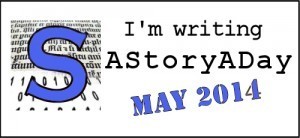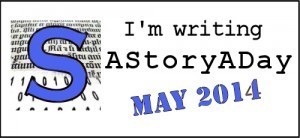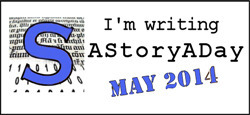Julie Duffy's Blog, page 170
April 8, 2014
[Reading Room] Golden by James Scott Bell


Author James Scott Bell, as well as being a successful lawyer, novelist and writing coach, has been a good friend to StoryADay (giving us both an interview and a writing prompt for last year’s StoryADay May).
So of course, I wanted to like his new story, which veers from his usual style. No mysteries here, no fast-paced action, just the story of a guy dealing with the legacy of something in his past that he’s not proud of.
Writing (and publishing) this story was a big leap for Bell (as he explained when he announced it). he was nervous. It wasn’t like anything he’d ever written before and he was worried that he might fall flat on his face.
Don’t you feel like that, a lot of the time when you sit down to write? I know I do.
So I went into this story wanting to like it. but I wasn’t sure I was going to. I mean, what do I care about a middle-aged, middle-class divorced father on a playdate with his son?
Well, Bell quickly made me care. He does it by using all the craft available to him. Within the first paragraph I’ve learned a lot about the guy, his divorce, the ex-wife. Look how much information he packs into sentences 3 & $ of the story — and not just information, but attitude, character background, exposition, the whole shebang:
“Judy and I reached an amicable settlement on custody, mainly because I didn’t want to fight her anymore. Her family is well off and were not shy about retaining the biggest shark tank in L. A.”
The story is about more than just a bitter divorcé, though. Rather it is about a father reliving something that happened when he was a kid, a little older than his son.
One of the things I noticed about this story (and all of Bell’s writing) is the strength of the narrator’s voice when he’s writing in first person. It is always dipping with character, attitude and is firmly rooted in wherever the character is from (usually L. A.). In this story, even when he takes the character back in time to his teenage years, the voice is distinctive and unmistakably the voice of a teen,
“That’s what got him in bad with Robbie Winkleblack…”
“I ran away, too, but I wasn’t laughing. I was thinking it was all over for me now. I’d be kicked out of school, maybe thrown into juvie.”
How can you make readers care about your characters whether or not they think they are going to?
Read James Scott Bell’s article on why he wrote this and why short stories are so awesome




April 3, 2014
Best Of The Web for Short Story Writers April 2014

Writing by Night by bluelectric, Creative Commons License
How To Revise Your Novel At A Glance | Write to Done
http://writetodone.com/revise-novel-g...
This is an intriguing string to add to your Revisions bow: shrink your manuscript down to a tiny font and see it at a glance. Worth a read, though it’s not the only revision tactic you’re going to need…
Surround Yourself with Passionate People : zenhabits
http://zenhabits.net/surround/
…and not just writers!
20 Authors Share Tips for Writing Love Scenes – GalleyCat
http://www.mediabistro.com/galleycat/...
There were some really eye-opening and thoughtful comments in this article. Well worth a few minutes to read.
How To Use Evernote For Writing Fiction | LifeHacker
http://lifehacker.com/how-to-use-ever...
After you’ve been writing for a while, it can be a challenge to keep track of all your pieces. This shows you one method for using Evernote to keep things together.
Why I Write Flash Fiction « Flash Fiction Chronicles
http://www.everydayfiction.com/flashf...
A lesson in how to use rejection to spur you on!
How to Write Paragraph After Paragraph After Paragraph Non-Stop
http://www.writewithwarnimont.com/how...
Three different methods for getting the creative ball rolling. One could work for you…
What I’ve Learned as a Writer : zenhabits
Of course, I like this article because #1 is “Write every damn day”  But there’s lots of other good stuff in here too.
But there’s lots of other good stuff in here too.
You don’t have to write every day | Nathan Bransford, Author
http://blog.nathanbransford.com/2014/...
Sacrilege! (But of course, this opposing view, from Nathan Bransford, is a perfect tonic for those of us who can only ‘write every day’ when it doesn’t mean “every day forever, without fail, and you suck if you can’t”).
throw another bear in the canoe – you are the silence in between what i thought and what i said
http://matociquala.livejournal.com/22...
Peek inside a working writer’s productivity-tracking method and see just how many words-for-pay she writes every year.
The Varied Emotional Stages Of Writing A Book « terribleminds: chuck wendig
http://terribleminds.com/ramble/2014/...
We can always rely on Chuck Wendig to share the seamier side of life as an author. This hilarious post captures it all.




April 2, 2014
WEDNS – 1.01 – The Importance Of Writing Every Day
Why not wait, and write “some day”? Spend 15 minutes with Julie Duffy, write and host of the StoryADay May challenge (storyaday.org) and find out why you should be writing NOW, not later.
Don’t Wait! Write Now!
This week’s writing assignment mines your memories of life at different stages.
Another new episode of Write Every Day, Not “Some Day”




April 1, 2014
[Write on Wednesday] Eons

Source: Hubblesite.org
Last week we talked about writing a story in the moment before a car crash: everything in the story took place during a few seconds in the brain of your main character. This week we’re going to the opposite extreme
The Prompt
Write A Story That Takes Place Over Eons
(or just a really long time)
Tips
Obviously, since humans don’t live for eons, you’re going to have to choose something else as the thing that provides continuity in this story: it might be a location on the earth; a multi-generational spaceship crew traveling through unimaginable reaches of space; an alien; a centuries-old mollusk; a tree.
You can write a narrative story if you like, but this might lend itself to some different forms: letters, tweets, journal entries, a string of news articles; a faux-holy book written in different styles in different eras. Have fun with this.
Thing big thoughts. Eons give you a lot of scope to investigate big ideas.
Don’t make the story too long. Big ideas don’t necessarily mean high word count.
Don’t forget to include small details, mundane moments, things your readers can hang their emotions on.
Go!




March 31, 2014
[Reading Room] There Will Come Soft Rains by Ray Bradbury
A house stands alone in a post-nuclear-strike landscape. It is one of those Tomorrowland kind of houses that people dreamed of in the 1950s: the stove is cooking eggs and bacon, the mice-robots are scurrying out to clean, the automatic systems are trying to entertain the absent occupants. Absent? Yes, and we find out what happened to those occupants in a shocking moment that is less shocking nowadays, because we’ve seen it before. But Bradbury was writing when these ideas and fears were new.
The story continues without a single human in it and yet it we come to know the former occupants of the house, their culture and also the character of the house.
Dig Deep And Find Your Unique Voice
Ray Bradbury’s writing is deeply poetic and thoroughly unique. It is a wonderful example of how you can find your voice only be being unapologetically yourself. Written by anyone else, this kind of lyrical writing would be overblown and possibly embarrassing. In Bradbury’s handling, it is just….well, Bradbury.
How To Write A Story Without A Human Protagonist
It’s also a wonderful example of how you can write a story without a traditional protagonist and yet still have a character.
In this story the house is definitely the protagonist, if a protagonist’s job is to guide us through a story and show us a new world in a new way. The house in this story is very much that protagonist. It tells us about the world that humanity has created for itself. It tells us what we have done to ourselves and points out the folly of the story’s human race: concentrating all its creative energies on making gadgets to make life comfortable instead of on solving the looming nuclear threat.
The story has secondary characters too: the family that lived in the house and the former household pet (who play the classic ‘secondary character role’ by being referenced in the story only when they contribute something to our understanding of the protagonist — in this case, the house).




March 25, 2014
[Write On Wednesday] Time Slowed Down
You know that old cliché: time slowed?
Well, if you’ve ever been in a car crash or any kind of accident, you’ll know exactly what that means: the amygdala (the seat of emotion in your brain) kicks in and calmly starts recording every detail. When you go back over your memories, the moment will seem to have lasted at least 30% longer than it actually could have.
The way to recreate this in fiction is not to say “time slowed” but to actually recreate the ‘amygdala effect’: describing in excruciating detail everything your character experiences in those elongated moments. Usually these occur in the moment of anticipation, when you KNOW something bad is about to happen but can do nothing to stop it.
The Prompt
Write A Story That Happens In The Moment Before An Accident
Tips
Start your story at the moment when the accident has begun to happen: the car is sliding, the character is falling; her finger is coming back up from clicking ‘send’ on the email when she see that the ‘to’ field contains the name of the person she’s actually bitching ABOUT…
Describe every detail of what’s happening Take some time to give us backstory as the character’s mind flashes back on what is important to her Make us care about the character (love or despise, either way).
End the story when the character has made an emotional change, not necessarily when they land/crash. You can leave them spinning through the air if you want to, and allow the reader to make up the rest.
Go!




March 23, 2014
StoryADay 2014 Participant Badges
Here are your StoryADay May 2014 Participant Badges!
Download them and use them on your websites or where ever you like.
Let everyone know you’re planning on taking part!
(Right-click to download whichever size you like)
500 x 230 pixels
300 x 138 pixels
250 x 115 pixels
200 x 92 pixels
150 x 59 pixels




StoryADay 2014 Graphics
Here are your StoryADay May 2014 Participant Badges!
Download them and use them on your websites or where ever you like.
Let everyone know you’re planning on taking part!
(Right-click to download whichever size you like)
500 x 230 pixels
300 x 138 pixels
250 x 115 pixels
200 x 92 pixels
150 x 59 pixels




March 20, 2014
Best Of The Web For Short Story Writers March 2014

Before and After: Do a Little Work, Every Single Day. « The Happiness Project
http://gretchenrubin.com/happiness_pr...
Guest blogger Caroline McGraw talks to Gretchen about how working a little every day can make big scary tasks (writing a completed work) less scary and less hard.
Tips for Young Writers | Elizabeth Spann Craig
http://elizabethspanncraig.com/1627/t...
This guest post by Aidyl Ewoh could just as easily be called “Tips For Writers”. Great stuff here from “Surround yourself with positive people” to “Consistency trumps quantity” to “Read a lot” and “Find a writing community”… This blogger is singing my song!
Tales from the Den of Chaos: Belief and Possibility
http://www.denofchaos.com/2014/01/bel...
A rumination on the magic of the “New Year”, which we writers can apply at any point in the calendar:
“…human belief is an incredibly powerful thing. When we believe something is possible, no matter how enormous a task it may be, if we really believe we can do it…we will. As long as we do not succumb to doubt, as long as we are willing to keep getting up after we’ve taken a fall, as long as we see these failures not as hard-stops but rather as learning how not to do that totally possible thing – we will do it.”
Flash Fiction Chronicles’ Favorite Short Fiction list 2013
http://www.everydayfiction.com/flashf...
Yup, I’m late discovering this post, but if you’re looking for something to read (or for places to send your own fiction) this is a great starting point.
3 Writing Tips You Can Steal From Animators
http://thewritepractice.com/animator-...
Three great tips here. Not the usual rehashing of story structure tips or character tips or how to make your dialogue sound real. Instead, this article talks about three great ways to actually make the writing happen.
flax-golden tales: simple steps « erin’s emporium of discount dreams & well-worn wonders
http://erinmorgenstern.com/2014/01/fl...
This is both a short story and an admonition to other artists, from Erin Morgenstern, author of the wildly successful novel The Night Circus. Read it slowly, then follow her advice!
When You’re Feeling Self-Doubt & a Lack of Motivation : zenhabits
Not writing advice but great living advice that will help you get back to your writing on a day when you’re not sure you’re really a writer. (Hint: you are. Use the steps in this article to get yourself back to a place where you can be)
Action Reveals Character – Books & Such Literary Management : Books & Such Literary Management
http://www.booksandsuch.com/blog/acti...
“In real life, it’s not what a person says that shows us who they are, it’s what they do…” Lovely short article on how to make your characters reveal themselves with subtlety.
It Takes The Time It Takes « terribleminds: chuck wendig
http://terribleminds.com/ramble/2014/...
Chuck Wendig talks about his 20-year-long overnight success, and gives hope to the most impatient among us.
Ten things you can write in ten minutes or less – Time to Write
http://timetowrite.blogs.com/weblog/2...
What to write when you don’t have time to write 
Strategy of Loophole-Spotting #3: the Tomorrow Loophole. « The Happiness Project
http://www.gretchenrubin.com/happines...
Do you put off until tomorrow what could be done today?
http://killzoneauthors.blogspot.com/2...
James Scott Bell advocates never giving up on creativity, and offers some suggestions on how to do that! (Includes an adorable picture of Herman Wouk)
What Does 2 Billion Book Sales Look Like?: InfoGraphic | Lovereading UK
http://visual.ly/what-does-2-billion-...
This is just awesome. Go and look.




March 18, 2014
[Write On Wednesday] Give Us A Hint


Yesterday I wrote about “Hint Fiction”, a book of stories told in fewer than 25 words.
The Prompt
Write A Story In No More Than 25 Words
Tips
Remember that, in short fiction, you are collaborating with the reader. Make them supply a lot of the detail by leaving spaces for their imaginations to fill.
Feel free to write a longer story first and cut it down
Don’t expect this to be easy or quick: 25 words is almost nothing!
Read this review of the book Hint Fiction to see some examples of how this can be done well.
Choose a moment that has some ambiguity in it.
Make the title count.
Here’s mine:
The Moment That Altered The Course Of Her Life
Her arm, casually draped across his chest, felt a sudden, pounding footrace: his brain vainly chasing the escaping heart-words. Her pause, a lifetime. Then: yes.
Go!













